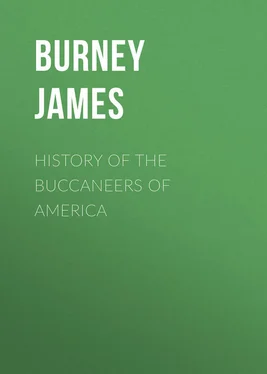James Burney - History of the Buccaneers of America
Здесь есть возможность читать онлайн «James Burney - History of the Buccaneers of America» — ознакомительный отрывок электронной книги совершенно бесплатно, а после прочтения отрывка купить полную версию. В некоторых случаях можно слушать аудио, скачать через торрент в формате fb2 и присутствует краткое содержание. Жанр: foreign_antique, foreign_prose, на английском языке. Описание произведения, (предисловие) а так же отзывы посетителей доступны на портале библиотеки ЛибКат.
- Название:History of the Buccaneers of America
- Автор:
- Жанр:
- Год:неизвестен
- ISBN:нет данных
- Рейтинг книги:4 / 5. Голосов: 1
-
Избранное:Добавить в избранное
- Отзывы:
-
Ваша оценка:
- 80
- 1
- 2
- 3
- 4
- 5
History of the Buccaneers of America: краткое содержание, описание и аннотация
Предлагаем к чтению аннотацию, описание, краткое содержание или предисловие (зависит от того, что написал сам автор книги «History of the Buccaneers of America»). Если вы не нашли необходимую информацию о книге — напишите в комментариях, мы постараемся отыскать её.
History of the Buccaneers of America — читать онлайн ознакомительный отрывок
Ниже представлен текст книги, разбитый по страницам. Система сохранения места последней прочитанной страницы, позволяет с удобством читать онлайн бесплатно книгу «History of the Buccaneers of America», без необходимости каждый раз заново искать на чём Вы остановились. Поставьте закладку, и сможете в любой момент перейти на страницу, на которой закончили чтение.
Интервал:
Закладка:
Columbus whilst he was in Spain received mortification in two instances, of neither of which he had any right to complain. In October 1496, three hundred natives of Hayti (made prisoners by the Adelantado) were landed at Cadiz , being sent to Spain as slaves. At this act of disobedience, the King and Queen strongly expressed their displeasure, and said, if the Islanders made war against the Castilians, they must have been constrained to do it by hard treatment. Columbus thought proper to blame, and to disavow what his brother had done. The other instance of his receiving mortification, was an act of kindness done him, and so intended; and it was the only shadow of any thing like reproof offered to him. In the instructions which he now received, it was earnestly recommended to him to prefer conciliation to severity on all occasions which would admit it without prejudice to justice or to his honour.
1498. It was in the third voyage of Columbus that he first saw the Continent of South America , in August 1498, which he then took to be an Island, and named Isla Santa . He arrived on the 22d of the same month at the City of San Domingo .
The short remainder of Columbus's government in Hayti was occupied with disputes among the Spaniards themselves. A strong party was in a state of revolt against the government of the Columbuses, and accommodation was kept at a distance, by neither party daring to place trust in the other. 1498-9. Columbus would have had recourse to arms to recover his authority, but some of his troops deserted to the disaffected, and others refused to be employed against their countrymen. In this state, the parties engaged in a treaty on some points, and each sent Memorials to the Court. The Admiral in his dispatches represented, that necessity had made him consent to certain conditions, to avoid endangering the Colony; but that it would be highly prejudicial to the interests of their Majesties to ratify the treaty he had been forced to subscribe.
Beginning of the Repartimientos. The Admiral now made grants of lands to Spanish colonists, and accompanied them with requisitions to the neighbouring Caciques, to furnish the new proprietors with labourers to cultivate the soil. This was the beginning of the Repartimientos , or distributions of the Indians, which confirmed them slaves, and contributed, more than all former oppressions, to their extermination. Notwithstanding the earnest and express order of the King and Queen to the contrary, the practice of transporting the natives of Hayti to Spain as slaves, was connived at and continued; and this being discovered, lost Columbus the confidence, but not wholly the support, of Queen Ysabel.
1500. Government of Bovadilla. The dissensions in the Colony increased, as did the unpopularity of the Admiral; and in the year 1500, a new Governor General of the Indies , Francisco de Bovadilla, was sent from Spain , with a commission empowering him to examine into the accusations against the Admiral; and he was particularly enjoined by the Queen, to declare all the native inhabitants free, and to take measures to secure to them that they should be treated as a free people. How a man so grossly ignorant and intemperate as Bovadilla, should have been chosen to an office of such high trust, is not a little extraordinary. His first display of authority was to send the Columbuses home prisoners, with the indignity to their persons of confining them in chains. He courted popularity in his government by shewing favour to all who had been disaffected to the government or measures of the Admiral and his brothers, the natives excepted, for whose relief he had been especially appointed Governor. To encourage the Spaniards to work the mines, he reduced the duties payable to the Crown on the produce, and trusted to an increase in the quantity of gold extracted, for preserving the revenue from diminution. All the Natives compelled to work the Mines. This was to be effected by increasing the labour of the natives; and that these miserable people might not evade their servitude, he caused muster-rolls to be made of all the inhabitants, divided them into classes, and made distribution of them according to the value of the mines, or to his desire to gratify particular persons. The Spanish Colonists believed that the same facilities to enrich themselves would not last long, and made all the haste in their power to profit by the present opportunity.
By these means, Bovadilla drew from the mines in a few months so great a quantity of gold, that one fleet which he sent home, carried a freight more than sufficient to reimburse Spain all the expences which had been incurred in the discovery and conquest. The procuring these riches was attended with so great a mortality among the natives as to threaten their utter extinction.
Nothing could exceed the surprise and indignation of the Queen, on receiving information of these proceedings. The bad government of Bovadilla was a kind of palliation which had the effect of lessening the reproach upon the preceding government, and, joined to the disgraceful manner in which Columbus had been sent home, produced a revolution of sentiment in his favour. The good Queen Ysabel wished to compensate him for the hard treatment he had received, at the same time that she had the sincerity to make him understand she would not again commit the Indian natives to his care. All his other offices and dignities were restored to him.
1501-2. Nicolas Ovando, Governor. For a successor to Bovadilla in the office of Governor General, Don Nicolas Ovando, a Cavalero of the Order of Alcantara , was chosen; a man esteemed capable and just, and who entered on his government with apparent mildness and consideration. But in a short time he proved the most execrable of all the tyrants, 'as if,' says an historian, 'tyranny was inherent and contagious in the office, so as to change good men to bad, for the destruction of these unfortunate Indians.'
Working the Mines discontinued by Orders from Spain. In obedience to his instructions, Ovando, on arriving at his government, called a General Assembly of all the Caciques or principal persons among the natives, to whom he declared, that their Catholic Majesties took the Islanders under their royal protection; that no exaction should be made on them, other than the tribute which had been heretofore imposed; and that no person should be employed to work in the mines, except on the footing of voluntary labourers for wages.
1502. On the promulgation of the royal pleasure, all working in the mines immediately ceased. The impression made by their past sufferings was too strong for any offer of pay or reward to prevail on them to continue in that work. [The same thing happened, many years afterwards, between the Chilese and the Spaniards.] A few mines had been allowed to remain in possession of some of the Caciques of Hayti , on the condition of rendering up half the produce; but now, instead of working them, they sold their implements. In consequence of this defection, it was judged expedient to lower the royal duties on the produce of the mines, which produced some effect.
Ovando, however, was intent on procuring the mines to be worked as heretofore, but proceeded with caution. In his dispatches to the Council of the Indies , he represented in strong colours the natural levity and inconstancy of the Indians, and their idle and disorderly manner of living; on which account, he said, it would be for their improvement and benefit to find them occupation in moderate labour; that there would be no injustice in so doing, as they would receive wages for their work, and they would thereby be enabled to pay the tribute, which otherwise, from their habitual idleness, many would not be able to satisfy. He added moreover, that the Indians, being left entirely their own masters, kept at a distance from the Spanish habitations, which rendered it impossible to instruct them in the principles of Christianity.
Читать дальшеИнтервал:
Закладка:
Похожие книги на «History of the Buccaneers of America»
Представляем Вашему вниманию похожие книги на «History of the Buccaneers of America» списком для выбора. Мы отобрали схожую по названию и смыслу литературу в надежде предоставить читателям больше вариантов отыскать новые, интересные, ещё непрочитанные произведения.
Обсуждение, отзывы о книге «History of the Buccaneers of America» и просто собственные мнения читателей. Оставьте ваши комментарии, напишите, что Вы думаете о произведении, его смысле или главных героях. Укажите что конкретно понравилось, а что нет, и почему Вы так считаете.












